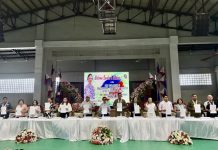PALO,Leyte-In areas affected by natural disasters, the risks for adolescents are high. They are often forced to flee their homes, frequently leaving behind family and friends and the familiarity and stability of their former lives. The breakdown in health systems and services and support structures increases their vulnerability. Thus, displaced adolescents face a host of difficulties that affect their sexual and reproductive health. To address this gap, the Commission on Population (POPCOM) regional office, through its Adolescent Health Youth Development Program (AHYD) has joined forces with international development partners in its full humanitarian response in areas affected by super Typhoon Yolanda that hit the region last November 8, 2013. Melanie Alberto, AHYD Program focal person, said the stakes are highest for adolescent girls when aside from increased exposure to rape and sexual violence, young women who have been uprooted from their homes often face economic strains and may be forced to trade sex to meet their basic survival needs. “These situations leave our adolescents and youth vulnerable to early pregnancy, sexually transmitted infections (STI) and psychological distress among other consequences,” Alberto added. “As part of the urgent need to scale up services for adolescent sexual reproductive health, we joined Save the Children’s program called ASRHiE or Adolescent Sexual Reproductive Health in Emergency,” she added. Alberto said ASRHiE aimed to consistently provide access to information, services and referrals with results demonstrating positive reproductive health outcomes for young people. ASRHiE would run for six months up to one year and to be implemented in 11 areas in Leyte particularly in the cities of Tacloban and Ormoc, and the municipalities of Palo, Tanauan, Tolosa, Dulag, Mayorga, MacArthur and Alangalang. About 5,000 adolescents (10 to 24 years old) from these areas are being targeted for its various adolescent sexual reproductive health programs and activities. “Part of the project was the launching of youth-friendly spaces in project areas to provide adolescent and youth sexual reproductive health related services,” Alberto said. Tents were set up in each project area as a temporary Youth-Friendly Space that provide services on Adolescent Reproductive Health (ARH) education sessions, counseling, basic first aid, recreational activities, visual and creative arts, ration of hygiene and dignity kits for pregnant and lactating teenage mothers, and referral of cases to both public and private health facilities. These referrals include medical consultation, FP counseling, pre and post-natal check-up, immunization and infant and young child feeding counseling. Alberto said that part of the ASRHiE activities include the mobilization of youth volunteers/peer educators where they are to deliver health information; distribute hygiene kits; collect data; do peer counseling; facilitate psychosocial support activities in YFS-creative/art sessions, games, sports, music and dance; act as formal referral agents and perform other related tasks. “We are thankful to our development partners that they were here to implement programs that are in line with our advocacy on youth participation in the promotion of responsible adulthood, responsible romantic relationships and on the other proper management of their adolescent reproductive health concerns,” Alberto said. (PR)



